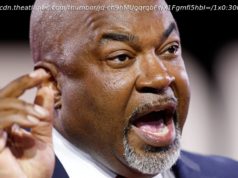Diversion of campaign money to tax-exempt non-profits could drain more than $1 billion from tax coffers.
A provision in the tax bill to allow churches to be more directly engaged in politics could cost the U. S. government hundreds of millions of dollars, congressional experts say, because some political donors would shift their money to tax-exempt charities.
The House Ways and Means Committee approved a sweeping overhaul of the tax code Thursday, including a provision to do away with the “Johnson Amendment,” a 1954 provision that forbids non-profit charities — called 501(c)(3)s — from endorsing political candidates.
President Trump has also promised to undo the Johnson Amendment through his executive powers.
When the tax bill was introduced last week, it included language that would ensure churches would not be deemed to have engaged in political activity “because of the content of any homily, sermon, teaching, dialectic, or other presentation made during religious services or gatherings.” On Thursday the committee expanded that provision to all 501(c)(3) charities.
A summary of the final bill states that no group would lose its non-profit status “because of engagement in certain political speech, as long as the speech is in the ordinary course of the organization’s business” and the organization’s political expenditures are minimal. That suggests that any charity mailer could arrive with a “Vote for Jones” tag line, for example.
Read more:
Nine differences between the House and Senate tax plans
Tax reform: Senate version of bill will delay corporate tax cuts one year
Republicans’ tax plan would let clergy endorse candidates from the pulpit
For evangelical groups in particular, the provision is a huge victory. The language written by chairman Kevin Brady, R-Texas, “puts an end to the IRS’s role of policing the speech of churches, and non-profit organizations,” said Tony Perkins, president of the conservative Family Research Council. “The IRS has no constitutional basis to monitor and then censor speech that doesn’t meet with the approval of government bureaucrats.”
Some political donors might then shift their contributions from political organizations that are not tax-exempt to churches or other charities that are tax-exempt to save themselves a little extra money, said Thomas Barthold, chief of staff for the congressional Joint Committee on Taxation.
But saving donors a little extra money would cost the U. S. treasury about $2.1 billion over 10 years, the joint committee predicted. The modified language cut the estimated cost to about $900 million by making the provision effective for only five years, but it is not clear that estimate accounts for the vast expansion of the universe of charities that could ramp up political activity.
Repealing the Johnson Amendment costs money because “it’s a diversion of some of the substantial growth in political contributions into a deductible form that’s not deductible today,” Barthold told the Ways and Means Committee on Monday.
“The proposal would say that certain political activity may perhaps now occur in religious organizations and we think that would give some incentive — in fact it’s very small — for some contributions that might currently go to what would be non-deductible political organizations,” Barthold said.
Advocates of stricter regulation of campaign donations say the broader repeal passed by the committee creates a broad new avenue for tax-deductible campaign spending.
“This is a really radical revision of the tax laws,” said Stephen Spaulding, chief of strategy at the government watchdog group Common Cause, and “it’s just ripe for abuse.
“I think you are going to see all kinds of backroom deals between funders and charities— or future charities that will be set up as sham charities,” Spaulding said. In addition, “certain ideological foundations will take on a more partisan tone — in both subtle ways and more explicit ways — pushing charities to go further than they have ever wanted to” toward endorsing candidates.
Spaulding also warned that it is up to the IRS to enforce these rules, but President Trump has proposed cutting the IRS budget by more than $200 million.
Tim Delaney, president of the National Council of Nonprofits, said his group vehemently opposes the change, which he says would make non-profits vulnerable to political demands by donors. “Charitable nonprofits don’t want to be dragged into the toxic political wasteland,” he said in a statement.
But Family Research Council’s David Christensen said the Ways and Means bill carefully balances the free speech rights of non-profits without turning them into political organizations. The bill protects “the ability to speak freely but it doesn’t allow or authorize expenditures for overt political actions,” he said. “They can’t go and do a $50,000 ad buy.”
The Johnson Amendment repeal is not in the Senate’s version of the tax overhaul.






